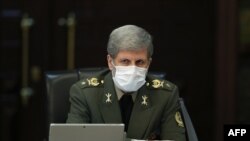Iran's senior vice president and two other Cabinet members have contracted the new coronavirus, a semiofficial news agency reported Wednesday as the death toll in the Islamic Republic from the outbreak rose by 62 to 354.
The report by the Fars news agency, believed to be close to Iran's paramilitary Revolutionary Guard, comes as President Hassan Rouhani took control of the country's much-criticized response to the virus and the COVID-19 illness it causes. Authorities announced that there were some 9,000 confirmed cases of the virus across Iran.
The Fars story also comes amid days of speculation about the health of Vice President Eshaq Jahangiri. Jahangiri has not been seen in pictures of recent top-level meetings, raising concerns about him.
Fars says the others sick are Ali Asghar Mounesan, minister of cultural heritage, handcrafts and tourism, and Reza Rahmani, minister of industry, mines and business.
There was no immediate report on state media about the officials being ill and no other media outlet in Iran immediately carried the report. Fars published it in a picture list of names in Farsi, with Jahangiri's name at the top.
Across the Mideast, the vast majority of the 9,700 people who have contracted the coronavirus and the COVID-19 illness it causes are in hard-hit Iran or had recently returned from there. The Islamic Republic has one of the world's worst death tolls outside of China, the epicenter of the outbreak. Outside of Iran, only Iraq, Egypt and Lebanon have recorded deaths from the virus in the Middle East.
In the Gulf Arab island nation of Bahrain, authorities say their number of confirmed cases on Wednesday spiked by nearly 70% to 189 confirmed cases. The 77 new cases were all on a returning flight of Bahraini evacuees from Iran.
There are concerns that the number of infections across Iran is much higher than the confirmed cases reported by the government, which is struggling to contain or manage its spread. The rising casualty figures each day in Iran suggest the fight against the new coronavirus is far from over.
For most people, the new coronavirus causes only mild or moderate symptoms, such as fever and cough. For some, especially older adults and people with existing health problems, it can cause more severe illness, including pneumonia. The vast majority of people recover from the new virus.
Among the dead are five of the Guard members and an unspecified number of the Guard's volunteer Basij force.
Iran's supreme leader had said Tuesday that the Islamic Republic will recognize doctors and nurses who die combating the new coronavirus as “martyrs.”
The decision by Supreme Leader Ayatollah Ali Khamenei comes amid a propaganda campaign already trying to link the fight against the virus to Iran's long, bloody 1980s war with Iraq. Its forces, which include virologists, faced chemical weapons during Iran's eight-year war against Iraq.
That the Guard is involved in the relief effort of a major catastrophe is not surprising in Iran. The Guard, whose forces include an estimated 125,000-plus troops and 600,000 mission-ready volunteers, routinely respond to the earthquakes that shake the country. Recent floods saw its troops mobilize as well.
Meanwhile, Saudi Arabia has barred travel to and from 14 countries affected by the new virus. Early on, as the virus spread in Asia, the kingdom stopped pilgrimages to Islam's holiest sites in Mecca and Medina, and cut travel links with China and later, Iran. It has also barred entry and exit for residents of Qatif, an eastern Saudi province where most of the country's 21 cases of the virus are confirmed after travel back to Iran.
Lebanon reported its second death Wednesday saying a 53-year-old man died of the virus. The Health Ministry said 37% of the cases reported in Lebanon originated from four countries: Egypt, Iran, Switzerland and the United Kingdom. Also, the country's restaurant association said all restaurants around the country will be closed until further notice, though delivery services will continue.
In Israel, Prime Minister Benjamin Netanyahu announced a $2.8 billion rescue package to stabilize the economy as it grapples with the virus. The money will double a previously announced fund to help businesses hit by the crisis to $2.4 billion. It also includes roughly $280 million for the health sector.
“The Israeli economy is in a better situation than most economies in the world,” Netanyahu said.”However, we have a great challenge here,'' he added. “In our view, we can also deal with it in a way that will allow us to get through it successfully in peace.”
I
Israel has diagnosed a total of 77 cases of the virus. It has imposed a number of restrictions, including two weeks of home quarantine for anyone arriving from overseas.
There are 26 confirmed cases in the Palestinian Territories.
News Agency: Iran VP, 2 Cabinet Members Have New Virus




